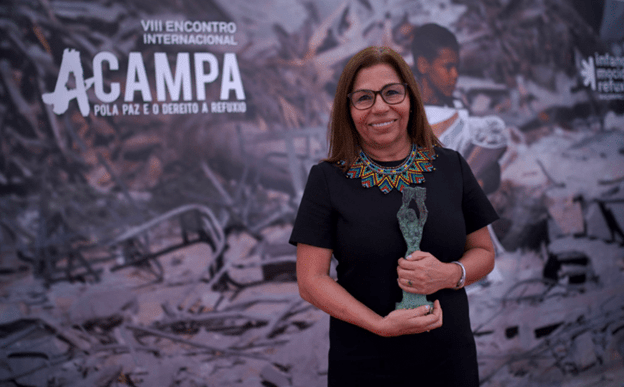
Haydee Castillo’s words at the ceremony awarding her the 2024 Acampa International Recognition for Defense of Human Rights.
By Haydee Castillo (Confidencial)
HAVANA TIMES – On this day, my thoughts are with Nicaragua’s political prisoners, with the mothers whose children’s lives were snuffed out by the Ortega-Murillo regime in April 2018; with the youth and the students expelled from the universities; with the indigenous people and the farmers who are constantly being dispossessed from their lands and territories through greed; with the human rights advocates like Vilma Nuñez, who currently survive day-to-day under house arrest; with the state employees forced to obey the regime in exchange for a salary. I’m thinking about the Rio Coco where I’ve bathed so many times, but that today is stalked by the fever for gold; and about all the people who are right now crossing some border in search of safety.
In difficult times, there’s no substitute for human warmth. Thank you ACAMPA for embracing through this recognition not only my modest contribution to the defense of human rights and the quest for peace, but also my aching and valiant Nicaragua.
I was born in a country that’s been the arena for occurrences of every kind in its search for freedom, self-determination and sovereignty. A country that’s well worth examining in the mirror and holding as a reference for study and practice; a history for humanity to reflect on and question the road we’re taking. In that little piece of land situated in the center of the Central American isthmus and bathed by two oceans, we’ve known everything – from earthquakes, to volcanic eruptions, to hurricanes. But also, rebellions full of dreams and hopes.
We’ve also been obliged to turn to war, when it seemed that defending life and freedom could only be obtained by that means, in the face of internal and external forces and powers with such huge claws that none of our different bands could see any other way out. A history that brings to mind our Prince of Spanish Literature, the great Nicaraguan poet Ruben Dario, in his poem, “The motives of the Wolf.” In this epic poem, he imagines a conversation where San Francisco de Asis wants to convince a wolf to abandon the road of killing he’s been forced to take to protect himself. The wolf responds:
– Brother Francis, do not come too near…
I was quiet there in the convent;
I visited the village,
and if they gave me something, I was happy,
and ate meekly.
But I started to see that in all of the houses
there was envy, anger and rage,
and in every face burnt fathoms
of hatred, lust, infamy and lies.
Brothers made war to brothers,
the weak lost, the evil won,
female and male were like dogs and bitches,
and then came the day when they all hit me with sticks.
They saw me humble, I licked their hands
and feet. I followed your sacred laws,
all creatures were my siblings:
brother men, brother oxen,
sister stars and brother worms.
And thus, they hit me and threw me out.
And their laughter was like boiling water,
and the beast revived within my gut,
and I suddenly felt an evil wolf again;
but always better than those bad people.
And returned to fight here,
to defend myself and to feed myself.
As the bear does, as the wild boar does,
that in order to live they have to kill.
Leave me in the mountain, leave me in the crag,
let me be at my liberty,
go back to your convent, brother Francis,
go back to your way and sanctity.
That’s the provocation our peoples face: noble people, simple, humiliated, led to their own graves when no


